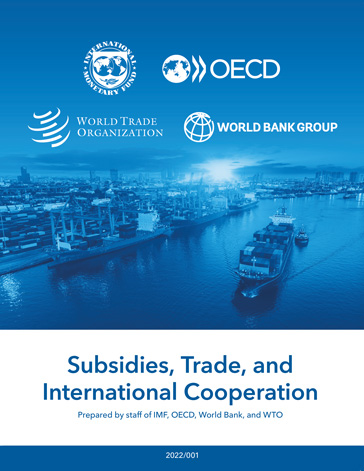WTO AND OTHER ORGANIZATIONS
Subsidies, Trade, and International Cooperation
Dealing constructively with subsidies in global commerce is central to G20 leaders’ goal of reforming and strengthening the multilateral trading system. The growing use of distortive subsidies alters trade and investment flows, detracts from the value of tariff bindings and other market access commitments, and undercuts public support for open trade. This publication finds that governments need to cooperate more on subsidies. It seeks to highlight the potential benefits of closer cooperation and considers some areas where this might be pursued constructively.
The publication looks at existing forms of cooperation, including the legal obligations governments have undertaken in the WTO and various regional agreements. It also explores additional actions that could help to address concerns. Better information, more extensive objective analysis and regular dialogue can help governments accelerate reform of their own subsidies and expedite negotiations toward improved international disciplines.
High-quality economic analysis is needed to understand not only how well current subsidy programs meet domestic policy objectives, and at what cost, but also how they spill over onto international markets and how they interact with international policy goals, like climate mitigation. Improved transparency and analysis, more robust inter-governmental consultation and strengthened international rules can be expected to reduce the use of harmful subsidies and to improve their design.
Co-published in 2022 by the IMF, OECD, the World Bank and the WTO.
Share
Problems viewing this page? If so, please contact [email protected] giving details of the operating system and web browser you are using.
